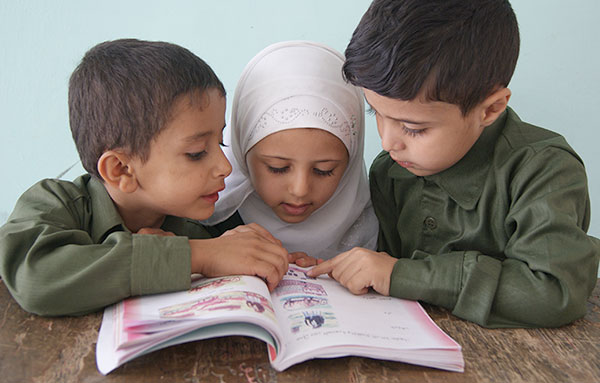A year ago, Fater, a twenty-one-year-old from Yemen’s southern Abyan governorate, dreamt of having her own sewing machine, a seemingly small dream. But as an unemployed young adult, Fater’s dream appeared beyond reach especially considering the grim statistics. In Yemen 54 percent of university graduates and 44 percent of those with intermediate education are unemployed. Since 2006, the poverty rate has jumped from 37 percent to 42 percent. Yet, giving up was not an option for Fater. She began working as a volunteer for the Aljol Association which also offered her training in sewing and embroidery. That way, she thought, when the opportunity to purchase a sewing machine arrived, she’d be prepared to use it.
With few options for alternative employment, Fater jumped at the opportunity to participate in the initiative implemented by Creative’s Community Livelihoods Project (CLP) through its local grantee, the For All Foundation. The CLP was offering trainings on basic life skills, entrepreneurship capacity building and small business start- up mechanisms to 140 local youths. Working with her peers, Fater chose to establish an incense and aromatic products business. “We decided to go with that business because it provides great opportunities for income and the products are easy to produce and quick to sell,” said Fater. Her new venture, however, did not dissuade her from pursuing her original dream of becoming a seamstress, in fact it sped her capacity to pursue her dream. “I managed to save money and achieved my goal,” she said. “I bought a sewing machine from Aljol and I am paying them by installments. I make incense and it is helping me a lot to purchase my sewing materials.”
The 140 youth in the Community Livelihoods Project-supported received 10 days of trainings to design and plan for their small businesses. Twenty-three-year-old Adel, like Fater, anxious to be productive but saddled with prolonged unemployment proceeded to volunteer for the Blood Donors’ Association where he learned about the upcoming USAID-funded entrepreneurship trainings. “I was unemployed since 2009, before I got involved with the CLP project. I have a diploma in computer programming and before joining this CLP program, I hoped to get a government job that would help me to further finance additional studies.”
While it seemed an ambitious undertaking for first-time business partners, Adel and his team chose to establish a restaurant and a small vegetable and chicken shop. But they had carefully thought and researched their idea. Following the unrest and security events that have taken place in Abyan during the period June 2011 to the present, many families have fled Abyan to neighboring Aden, leaving them without any source of income, shelter or other basic needs. CLP and its grantee For All Foundation which works in Aden, saw the situation as an opportunity to help improve displaced families’ lives by harnessing the energies and ideas of unemployed youth to fill the gaps. “We chose our business ideas to fill the need of the community because Abyan is suffering from a very bad security situation which has led to large scale displacement of families. Many do not have cookware, or there are men with no one to cook for them, so it is a good idea to open a restaurant and provide a needed service as well as being a good business,”said Adel.
Though Adel says he does not intend to work at the business for the rest of his life, as he wants to continue his studies, the project has motivated him in many ways. “I feel different about myself in addition to being financially independent. I am not asking my parents for money anymore. And, I am using my time well, I feel happier. Before my mental state was quite bad, I had a lot of time with nothing to do. I imagine that if I didn’t get this chance, I would possibly follow the lead of some guys and join one of the several extremist groups which roam the region looking for young people to convince them to join them and work on their agenda.”
Not only is Adel making better use of his time, but he claims his income has improved by 70 percent. As for Fater, she says if it wasn’t for the USAID-CLP project, she would still be working as a volunteer and trying to find a way to purchase a sewing machine and to have an independent business. “The project has improved my income big time,” said Fater. “My income is now 80 percent better.”
